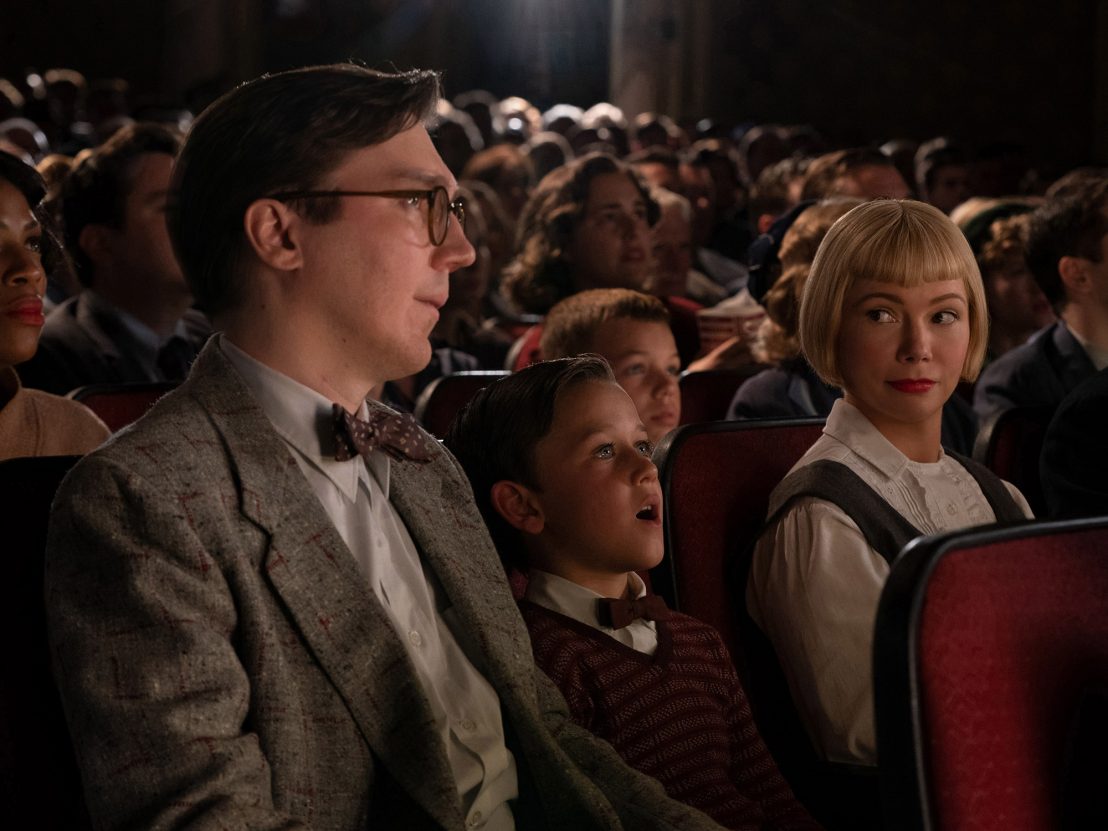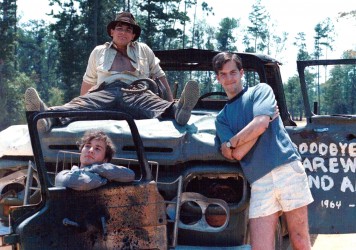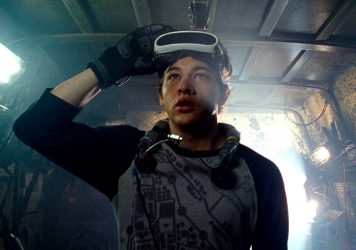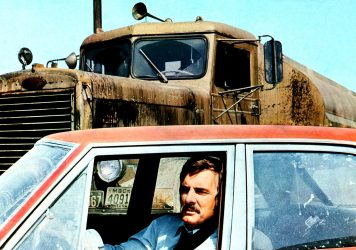
This bittersweet rummage through the Spielberg family album sees the maestro deliver a late-career masterwork.
“Steven Spielberg’s cinema has made us all into children of divorce,” concluded The Baffler’s Jonathan Sturgeon in a 2017 broadside. With The Fabelmans, an avowedly autobiographical coming-of-age story and his first screenplay credit since AI over 20 years ago, Spielberg beats against the current to return to the headwaters of his filmography, his parents’ own separation.
Restaging his movie-mad childhood as a Hollywood spectacle, he locates the source of the mingled childlike sense of awe, fear and, ultimately, reassurance that shapes his Hollywood-defining stories of families traumatically separated and sometimes reunited, from Close Encounters of the Third Kind to The Colour Purple to Empire of the Sun to Hook to Jurassic Park to Catch Me If You Can to War of the Worlds and on and on.
“Mommy and Daddy will be right next to you the whole time.” The Fabelmans tells you what it’s about from its very first line of dialogue, spoken outside of a New Jersey movie palace in early 1952. Before the lights go down, father Burt (Paul Dano) and mother Mitzi (Michelle Williams) offer their son Sam (Mateo Zoryna Francis-Deford as a child, Gabriel LaBelle as an adolescent) duelling explanations of the wonders to come.
Dad, a computer engineer, tells Sam about the mechanics of the moving image, 24 frames per second and persistence of vision. Mom, a concert pianist, says that movies are like dreams. The scientist and the artist will be the two poles of a life spent manufacturing miracles.
This life begins, like cinema itself, with a train. His inaugural viewing of The Greatest Show on Earth, with its climactic train crash, inspires young Sam to smash up the model railroad set that he receives for Hannukah. On Mom’s advice, he films the pileup, so he can watch it again whenever he wants without breaking his toys. From this initial actualité, Sam speed-runs the entire history of cinema up to the beginning of Spielberg’s career in the late 1960s.
With his fellow Boy Scouts, he makes a silent Western, Gunsmog, screened with an accompanying LP soundtrack; then a WWII movie; and a beach-blanket rock musical with his fellow members of the Class of ’64. Inspired by the classics, Fabelman demonstrates a precocious understanding of angles, matched with a shoestring ingenuity that calls to mind the next-generation child filmmakers of Raiders of the Lost Ark: The Remake. (And of course, Raiders itself was essentially a pastiche of a child’s favorite movies, too.)
For the final shot of his war film Escape to Nowhere (like Gunsmog, the title of a real Spielberg home movie), Fabelman’s camera tracks on a makeshift dolly while Spielberg’s camera rises on a crane, showing the eager teenage extras playing the corpses, standing up, running to a new position, and laying down again.
The simultaneous use of no-budget and big-budget moviemaking techniques bridges the gap between realisation and imagination. Sam’s parents and other older relatives invest in increasingly expensive toys for him, from a Bolex to a 16mm Arriflex—a potted history of consumer-grade narrow-gauge filmmaking in the postwar decades, to match a production design that evokes the ripening consumer paradise of America in the Truman to Johnson years.
Spielberg depicts a Boomer childhood as a lost Eden. The garden, the location of his nuclear family’s disintegration to which he nevertheless longs to return, is a camping trip, shot in hues as vibrant as the old Kodak Colorama murals in Grand Central, showcasing the American family at leisure in flannel shirts and woven folding chairs in an abundant spectrum of rich plaid hues. Sam films the trip, and, for the first time, has to find his story in the edit.
What he finds, looking back over the footage, is that his mother is in love with his father’s best friend, “Uncle Benny” (Seth Rogen). (Spielberg may be adapting the primal scene of his friend Brian De Palma, whose earliest efforts at photography included stalking his father in order to collect images of his cheating. It’s also true that family photos simply take on new resonances in hindsight.) Her attraction to him signals her desire for agency and adventure outside the restrictions of the family, and though she fuels her son’s artistic aspirations, her own dreams become a source of friction for Sam, the mirror image of his father’s pragmatic dismissal of filmmaking as a mere hobby.
As Mitzi, a frustrated artist suffocated by domesticity, Williams is overtly performative, striking poses and assuming attitudes, physically and verbally, a larger-than-life mother, like all our mothers used to seem. It’s an extravagant, potentially grating role and style of performance reminiscent of Gena Rowlands in A Woman Under the Influence, Ellen Burstyn in Alice Doesn’t Live Here Anymore or, more recently, Carey Mulligan in Dano’s own Wildlife.
It’s a case of a stifled housewife who channels all her excess ambition into a continuous command performance to a rapt and uncomprehending audience of her own children. Williams is doing emphatic work here, perhaps even beyond what is called for by a script that has Mitzi acting out by dancing in a nightgown around a campfire, piling the kids into the station wagon to drive toward a tornado, and buying a pet monkey.
Confronted by her son, Mitzi assures him that her affair of the heart with Benny never got physical, to which Sam responds, “I never imagined any of that”—perhaps the least intentional and most cutting of the film’s many meta-references to Spielberg’s biography and filmography. The Fabelmans features references to his early career, jokes about his lack of good parts for women, shots of kids streaming through their neighbourhood on bikes in that familiar E.T. image of kinetic innocence.
The film even ends on a metacinematic visual gag, which speaks to the fluency and accessibility of Spielberg’s film grammar. He’s got the reel world in his hands—literally, at one point, when young Sam holds his cupped palms in front of a projector beam to catch the images.
Also, The Fabelmans is, as the old social media meme goes, Good for the Jews: as Sam’s older relatives, Jeannie Berlin and Judd Hirsch are sarcastic and suffocating, droll and earthy, in their crowd-pleasingly broad scenes, though cowriter Tony Kushner’s ear for dialogue and Spielberg’s story sense abandon them at times in the film’s third act, as high school–aged Sam encounters antisemitic bullies and an evangelical love interest written with gratingly anachronistic inauthenticity.
Still, as Sam’s girlfriend, Chloe East is a hoot, sly and totally unselfconscious, and gets off some of the raciest gags in the entire, relatively sexless Spielberg oeuvre. The bullying subplot pays off as well: filming a senior-class beach party, Sam’s camera captures one of his blond tormenters with a gaze of frankly Riefenstahlian adoration; cutting together the film to screen at prom, Sam matches the boy’s eyelines with those of his ex-girlfriend, indulging in a private fantasy of parental reconciliation, played out in an ostensibly crowd-pleasing format.
The subject is confused and angry, feeling himself distorted by the movie. The implication, also evident in Sam’s increasing detachment from his family drama, is that this budding filmmaker is as selfish, in his way, as his career-driven father and narcissistic mother, that he is a cannibalistic genius, mining his life for his art and damn the consequences for the people in it.
This is quite a surprising confession to hear coming from the maker of Jurassic Park. But then, Orson Welles said that Hollywood was the best train set a little boy could ever had. When Sam Fabelman first wrecks his Lionel set, it’s following a nightmare in which he mentally replays the scene from Greatest Show on Earth and wakes up in sweat. Mitzi’s suggestion of filming the crash so that he can have control over it, master the fear, and then be able to revisit and resolve it whenever he wants, is straight out of Freud, who in Beyond the Pleasure Principle observed that his grandson would throw his toys out of his crib, traumatising himself with their absence so that he could experience the relief of their reappearance.
Spielberg himself has shown a compulsion to repeatedly fragment and reassemble his on-screen families. Returning again and again to his postwar childhood, Spielberg has used his consummate all-American moviemaking talent to upcycle personal recollection into lasting archetypes, and influenced self-referential pop culture on an industrial scale. The Fabelmans is an origin myth for nostalgia as we know it.
Little White Lies is committed to championing great movies and the talented people who make them.
Published 12 Sep 2022

A new documentary reveals how three best friends created the ultimate Hollywood homage.

Steven Spielberg’s high-octane pop culture bonanza is hamstrung by its corny, treasure hunt plotting.

This made-for-TV feature has all the trademarks that would go on to define one of America’s most acclaimed filmmakers.